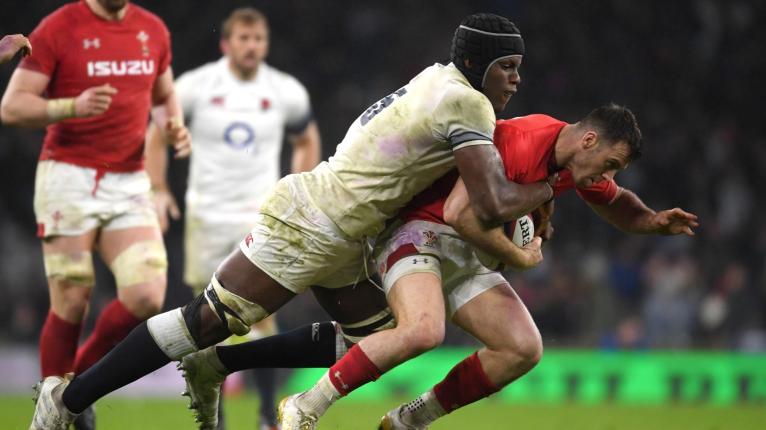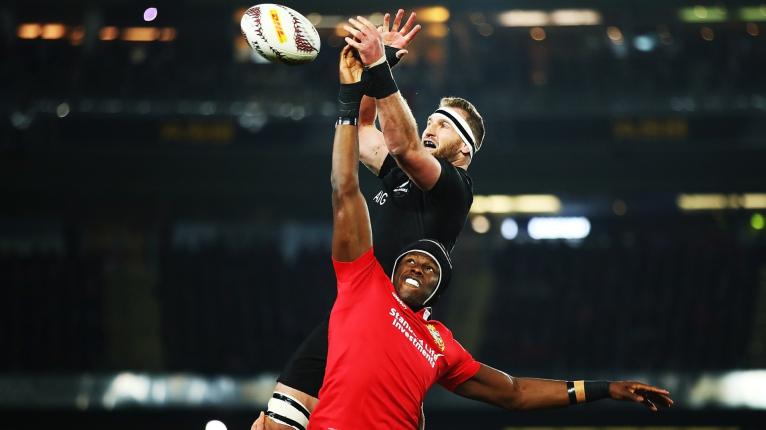What Maro Itoje needs to do to get into elusive 'world class' category

The story of Maro Itoje’s rugby career has been one of ceaseless, upward trajectory.
As a pupil at Harrow, he was a man among boys and even with Saracens U18s, playing with and against future Premiership and international teammates, he was a class apart. That was title number one.
Then came the step up to A League rugby with Saracens Storm, Anglo-Welsh Cup rugby and captaining the England U20 side in New Zealand in 2014. They were trophies two, three and four. People were starting to take notice.
From there came his break into senior rugby proper with Saracens in the Premiership, something which has accounted for three more winners’ medals. Don’t forget his call-up to the England Saxons, either, where he looked in his element ordering experienced international players around, all of whom were a good few years his senior.
Next step, European rugby. He has two of those nice shiny Champions Cup medals, as well as picking up a European Player of the Year award. I mean, who HASN’T done that?
He came into international rugby like a wrecking ball in 2016 and has not looked back since.
This is both an apt metaphor for the power and energy that Itoje brought to the Test arena, but also an opportunity to see if my editor has the guts to mock up a Miley Cyrus-esque image of Itoje, bowling his way through Joe Launchbury and Courtney Lawes.
Disturbing mental images aside, that’ll be one Grand Slam and another Six Nations title to add to the tally, not to mention a highly-praiseworthy series draw with the British and Irish Lions down in New Zealand.
With enough gold in the trophy cabinet to warrant a move to a tax haven, it’s fair to say it’s been one hell of a ride so far for the second-row.
That’s a glittering list of accomplishments, one that most players about to hang up their boots would be extremely pleased with, but Itoje isn’t about to hang up his boots. He’s still just 23 years of age.
Twenty-three. Since going professional at the age of 18, Itoje has averaged two trophies per season.
Having now paid sufficient accolade to the remarkable player Itoje has been and continues to be, it would be remiss not to acknowledge that, at international level, there may have been a plateauing of sorts over the past season.
That incessant upward trajectory had to stop at some point, or at least flatten out. There was no way it couldn’t.
For Itoje, that has come in the form of him becoming the ire of the referee’s whistle.
At international level in the 2017-18 season, Itoje has been pinged 18 times in nine starts (plus one appearance off the bench against Australia), averaging two penalties per start. It doesn’t sound catastrophic – and it’s not – but when combined with a pack incorporating several players also giving up a similar number, it has become a manageable but persistent problem for England.
Why hold Itoje to a higher standard than those other players leaking penalties? Because Itoje should be a future England captain.
He’s a natural leader of men and that has been evident from his schoolboy and academy days. From the ease with which he generates an aura of authority, to the respect he commands from his teammates, he innately has what many a fine player have spent their entire careers trying to develop.
It cannot, however, mask the discipline errors, which seem to fall into three categories – the acceptable, the avoidable and the unacceptable.
Starting with the acceptable, we have the high shots.
As a tackler, Itoje is prone to going slightly high with his hits, often targeting the ball and attempting to dislodge it. Those of you who are au fait with the NFL, think Charles Tillman.
“Peanut” Tillman created a niche for himself as he matured in the league, recognising that his speed and coverage skills would ultimately fail him as he got older and a different way of forcing turnovers was required for him to stay at the top of the game. He became an expert at dislodging the ball and Itoje has similar skills when trying to force knock-ons.
At the very least, it prevents the ball-carrier from offloading and it can lead to a chance at holding up the ball-carrier and forcing a turnover from the subsequent maul, something that England profited from twice in South Africa this summer when the second-row initiated choke tackles.
For the odd time that Itoje’s arms do end up riding higher on the carrier than he intended and conceding a penalty, it’s an acceptable cost for the benefits it regularly brings on the pitch. Don’t confuse these with high tackles with force around the neck and head area that are a risk to see yellow or red. He’s not playing recklessly, he’s taking a considered risk.

The avoidable penalties would be the ones conceded at the breakdown, most notably defensive breakdowns.
There’s a Saracens element to these penalties, with Jamie George and Mako Vunipola also prominent culprits and it revolves around the lingering of England players at the contact area. The way Saracens defend, flooding players out into the defensive line and putting on intense line speed every possible phase, is tailormade for players being deliberately lazy to roll away, as buying a second or even half a second can have very beneficial effects on the next defensive phase.
Itoje and others do get pinged for this at Premiership and European levels, but there is certainly more leniency towards it outside of the international arena. On the occasion that Saracens come up against a referee who will ping them harshly for it, they are regularly clinical enough to overcome it, something which is a result of their familiarity with one another, training together day in, day out. England aren’t wasteful, but they also can’t match that cohesion and understanding.
These are penalties which can be avoided and ones you’d expect Itoje to learn from and adapt his game accordingly.
Unless, of course, the England coaching staff are happy to concede them in return for what it can do for them on phases where the referee doesn’t pick it up and Itoje, among others, are actively encouraged to linger. If so, there’s only so savvy you can be and being caught from time to time is inevitable.
Continue reading below…
Even as a self-confessed driver of the Itoje hype train for years, the penalty offences which really irk, the ones that seem unacceptable, are the ones conceded at the lineout.
If we put together a spectrum of defensive lineout jumpers, the likes of Peter O’Mahony, Kieran Read and Lawes would be amongst the greatest threats to steal opposition ball and set the standard, whilst your average international second-row or lineout-jumping back-row, predominately offensive jumpers, would make up the other end.
Itoje probably slots in somewhere in the middle of this spectrum. He has a good vertical leap, reads the lineout well and has the wingspan to get his hands to the ball. He’s not quite in that O’Mahony calibre, but he’s above average – at international level – in this facet of the game.

As such, it’s frustrating to see the penalties conceded for putting his hands on opposition jumpers in the air. We talked up his ability to target the ball as a tackler earlier and it’s the same premise here, of being able to avoid foul play with good decision-making, split-second timing and polished execution.
Combine it with the odd penalty conceded for engaging with the jumper before he has landed – in an attempt to get the counter-maul rolling early – and it’s a frustrating watch because he’s a better defensive lineout player than that.
Perhaps it is a case of trying to do too much and overextending himself, with England short of defensive lineout jumpers recently, with Lawes out, Nick Isiekwe benched and Brad Shields still in the process of being incorporated into the side. If Lawes returns to the XV post-injury, Isiekwe is given another shot by Eddie Jones or Shields locks down the six jersey, then there’s a good chance we will see less asked of Itoje at defensive lineouts.
Regardless, it’s an area where he can improve and it’s a different narrative to the one that has surrounded Itoje so far in his professional rugby career.
Jones is right in one sense. We, as the media, do build up players to the point where people view them as infallible and no player is that.
There have been murmurs over the last few years that Itoje’s carrying game needs work and is not as effective as it was in age-grade rugby and others have wagged the finger at his vocal cheering of penalties won, but this is arguably the first time where there’s been a facet to his game that has come in for a significant level of criticism.
It’s exciting, right?
Not because a chink in the armour of a wonderfully-gifted player has been found, but because we can all now see the clear step that needs to be taken for Itoje to transcend from international star to becoming truly world class.
World class, as an accolade, gets bandied about all too easily. Unless you’re a consensus pick in a world XV, then you can’t, by definition, be world class.
Brodie Retallick is there in that engine room already and no one is going to dispute that, but who joins him?
Itoje is in the mix, as are Scott Barrett, James Ryan, Sam Whitelock and Eben Etzebeth among others, and though this has no real effect on material rugby matters, such as winning Test matches, it is still an interesting debate to be had.
I doubt any change in the narrative around Itoje will negatively affect the man himself, who has had no part in the hype or believing himself to be more than he is, but will it spur him on even further?
You can bet it will.
Short of winning the Rugby World Cup and a British and Irish Lions series, there’s surprisingly little left to achieve for Itoje in the game in terms of trophies and team achievements and that can be a hard place to be and motivate yourself.
After winning three back-to-back titles with the Chicago Bulls, Michael Jordan hung up his sneakers and tried his luck in baseball. He’d climbed the mountain in his sport and wanted a new challenge.
It was a determination to better himself and not accept being less than he was capable of being that brought Jordan back and it’s the same desire to be the best he can possibly be that will drive Itoje on.
I don’t know about you but I’m looking forward to what 2018-19 brings.




























































